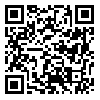Volume 4, Issue 2 (June 2025)
IJER 2025, 4(2): 0-0 |
Back to browse issues page
Download citation:
BibTeX | RIS | EndNote | Medlars | ProCite | Reference Manager | RefWorks
Send citation to:



BibTeX | RIS | EndNote | Medlars | ProCite | Reference Manager | RefWorks
Send citation to:
Karimi H, Minaei A, Moghadamzade A. (2025). The Impact of Demographic Characteristics on Response Styles in Personality Assessment: Examining the Role of Gender, Age, Education, and Their Interactions Using Multidimensional Item Response Theory Models. IJER. 4(2),
URL: http://ijer.hormozgan.ac.ir/article-1-452-en.html
URL: http://ijer.hormozgan.ac.ir/article-1-452-en.html
1- Department of Psychology, Sav.C., Islamic Azad University, Saveh, Iran
2- Associate Professor, Department of Educational Measurement, Faculty of Psychology and Education, Allameh Tabataba'i, Tehran, Iran ,as_minaei@yahoo.com
3- Associate Professor, Department of Educational Measurement, Faculty of Psychology and Education, University of Tehran, Tehran, Iran
2- Associate Professor, Department of Educational Measurement, Faculty of Psychology and Education, Allameh Tabataba'i, Tehran, Iran ,
3- Associate Professor, Department of Educational Measurement, Faculty of Psychology and Education, University of Tehran, Tehran, Iran
Abstract: (586 Views)
Objective: The present study was conducted with the aim of investigating the effect of demographic characteristics (gender, age and education level) on answering styles (extreme, moderate and agree) in personality questionnaires and using advanced models of multidimensional question-answer theory.
Methods: This descriptive-correlation study was conducted on the data of 17,994 participants who completed the Neo personality questionnaire. Three different models of multidimensional question-answer theory were used for data analysis, and finally, the generalized multidimensional partial validity model was selected as the best model. One-way and two-way analysis of variance was used to test the hypotheses.
Results: The findings showed that men have a significantly higher extreme and agreeable response style than women. With increasing age, the tendency to extreme response style increases and the tendency to moderate and agreeable styles decreases. Also, higher education levels were associated with more extreme response style and less agreeable response style. Furthermore, a significant interaction between gender and level of education was observed in predicting extreme response style.
Conclusions: The results of this research emphasize the importance of considering demographic characteristics in the process of designing, implementing and interpreting personality questionnaires. These findings can lead to increasing measurement accuracy and reducing biases caused by response styles.
Methods: This descriptive-correlation study was conducted on the data of 17,994 participants who completed the Neo personality questionnaire. Three different models of multidimensional question-answer theory were used for data analysis, and finally, the generalized multidimensional partial validity model was selected as the best model. One-way and two-way analysis of variance was used to test the hypotheses.
Results: The findings showed that men have a significantly higher extreme and agreeable response style than women. With increasing age, the tendency to extreme response style increases and the tendency to moderate and agreeable styles decreases. Also, higher education levels were associated with more extreme response style and less agreeable response style. Furthermore, a significant interaction between gender and level of education was observed in predicting extreme response style.
Conclusions: The results of this research emphasize the importance of considering demographic characteristics in the process of designing, implementing and interpreting personality questionnaires. These findings can lead to increasing measurement accuracy and reducing biases caused by response styles.
Keywords: Response styles, Multidimensional question-answer theory, Generalized multidimensional partial validity model
Type of Study: Original |
Subject:
Educational Psychology
Received: 2025/02/2 | Accepted: 2025/04/15 | Published: 2025/06/1
Received: 2025/02/2 | Accepted: 2025/04/15 | Published: 2025/06/1
Send email to the article author
| Rights and permissions | |
 |
This work is licensed under the Creative Commons - Attribution 4.0 International. |






